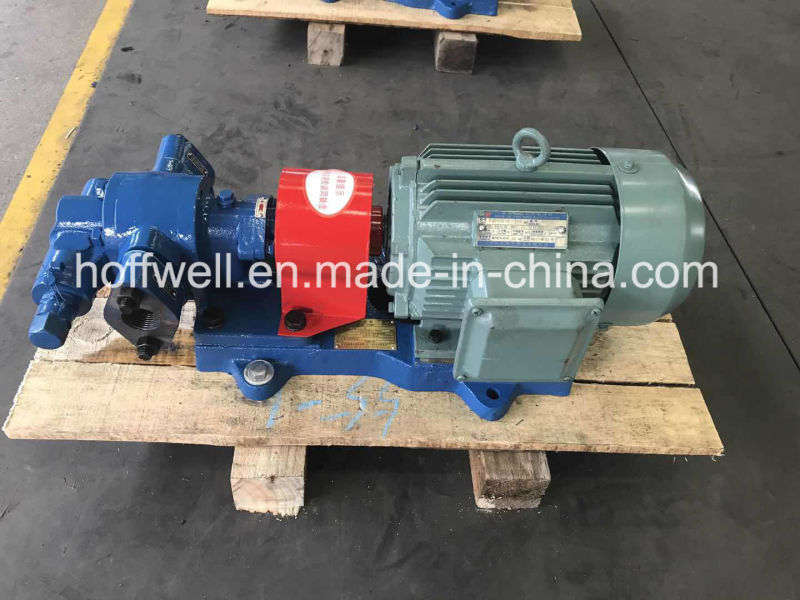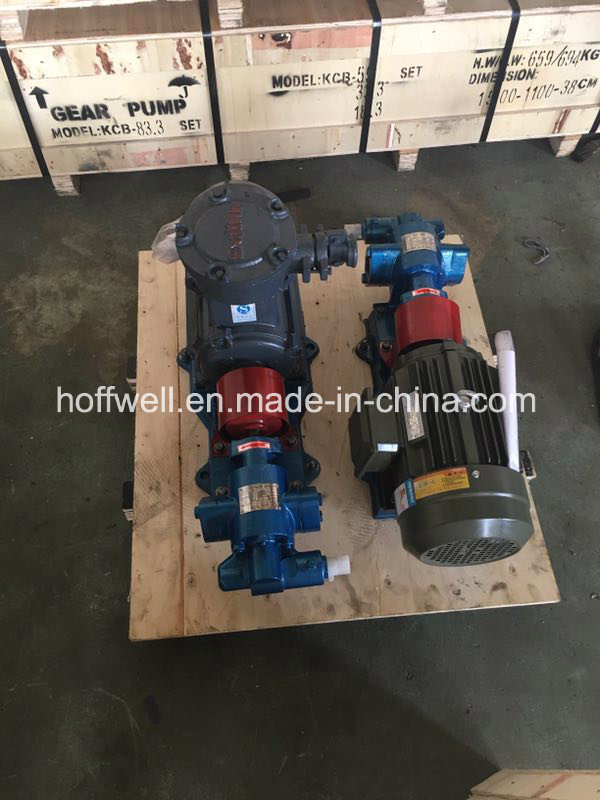CE Approved KCB33.3 Gear Oil Pump
- Model No.: KCB-33.3
- Tooth Flank: Skew Tooth
- Power: Electric
- Applications: Oil Industry
- Pump Body Material: Cast Iron HT200 / Stainless Steel
- Shaft Material: 45# Steel / Stainless Steel
- Coupling: Flexible Coupling / Magnetic Coupling
- Trademark: HOFFWELL
- Specification: CE, SGS
- HS Code: 84136029
- Mesh Form: Internal Engaged
- Tooth Curve: Involute
- Type: Normal Line Gear Pump
- Certification: CE, ISO
- Gear Material: 45# Steel / Stainless Steel / Bronze
- Seal: Mechanical Seal / Packing Seal
- Medium: Oil
- Transport Package: Export Standard Wooden Case
- Origin: China


**Product Features:** 1. The pump is carefully designed with a leakage and return channel system, which minimizes the torque on the gears and reduces the load and wear on the bearings, thus improving overall efficiency. 2. With fewer teeth and a compact design, the herringbone tooth structure ensures good stress distribution, minimal vibration, and strong performance. 3. The internal bearings are lubricated by the medium being pumped, making this pump ideal for handling lubricating liquids. **Application:** The KCB oil gear pump is widely used as a transfer or booster pump in oil delivery systems. It can also function as a fuel pump in fuel supply systems, providing pressurization and injection. Additionally, it serves as a lubricating pump in various industrial applications, making it a versatile solution across multiple sectors. **Conveyed Medium:** 1. Non-corrosive lubricants without solid particles or fibers. 2. Other types of lubricating liquids.
| Model | Capacity Q | Speed (r/min) | Exhaust Pressure (MPa) | (NPSH)r (m) | Efficiency η (%) | Motor | ||
| m³/h | L/min | Power (kW) | Model | |||||
| KCB-18.3 | 1.1 | 18.3 | 1400 | 1.45 | 5 | 44 | 1.5 | Y90L-4 |
| 2CY-1.1/1.45 | ||||||||
| KCB-33.3 | 2 | 33.3 | 1420 | 1.45 | 5 | 44 | 2.2 | Y100L1-4 |
| 2CY-2/1.45 | ||||||||
| KCB-55 | 3.3 | 55 | 1400 | 0.33 | 7 | 41 | 1.5 | Y90L-4 |
| 2CY-3.3/0.33 | ||||||||
| KCB-83.3 | 5 | 83.3 | 1420 | 0.33 | 7 | 43 | 2.2 | Y100L1-4 |
| 2CY-5/0.33 | ||||||||
| KCB-135 | 8 | 135 | 940 | 0.33 | 5 | 46 | 2.2 | Y112M-6 |
| 2CY-8/0.33 | ||||||||
| KCB-200 | 12 | 200 | 1440 | 0.33 | 5 | 46 | 4 | Y112M-4 |
| 2CY-12/0.33 | ||||||||
| KCB-300 | 18 | 300 | 960 | 0.36 | 5 | 42 | 5.5 | Y132M2-6 |
| 2CY-18/0.36 | ||||||||
| KCB-483.3 | 29 | 483.3 | 1440 | 0.36 | 5.5 | 42 | 11 | Y160M-4 |
| 2CY-29/0.36 | ||||||||
| KCB-633 | 38 | 633 | 970 | 0.28 | 6 | 43 | 11 | Y160L-6 |
| 2CY-38/0.28 | ||||||||
| KCB-960 | 58 | 960 | 1470 | 0.28 | 6.5 | 43 | 18.5 | Y180M-4 |
| 2CY-58/0.28 | ||||||||
| KCB-1200 | 72 | 1200 | 740 | 0.6 | 7 | 43 | 37 | Y280S-8 |
| KCB-1600 | 95 | 1600 | 980 | 45 | Y280S-6 | |||
| KCB-1800 | 112 | 1800 | 740 | 0.6 | 7.5 | 43 | 55 | Y315S-8 |
| KCB-2500 | 150 | 2500 | 985 | 75 | Y315S-6 | |||
| KCB-2850 | 170 | 2850 | 740 | 0.6 | 8 | 44 | 90 | Y315L1-8 |
| KCB-3800 | 230 | 3800 | 989 | 110 | Y315L1-6 | |||
| KCB-4100 | 245 | 4100 | 743 | 0.6 | 8 | 44 | 132 | Y355M1-8 |
| KCB-5400 | 325 | 5400 | 989 | 160 | Y355M1-6 | |||
| KCB-5600 | 330 | 5600 | 744 | 0.6 | 8 | 44 | 160 | Y355M2-8 |
| KCB-7600 | 460 | 7600 | 989 | 200 | Y355M3-6 | |||
| KCB-7000 | 420 | 7000 | 744 | 0.6 | 8 | 44 | 185 | Y355L1-8 |
| KCB-9600 | 570 | 9600 | 989 | 250 | Y355L2-6 | |||
Injection Machine Electric Motor
Injection machines, at the core of plastic molding processes, rely heavily on powerful and precise motors to function efficiently. Among these motors, the injection machine electric motor has emerged as a superior option, offering numerous advantages and unique characteristics compared to traditional hydraulic motors.
The electric motor for injection machines boasts exceptional energy efficiency. By converting electrical energy directly into mechanical power, electric motors eliminate the need for hydraulic pumps and valves, which often result in energy losses through heat generation and fluid friction. This efficiency translates into lower operating costs and reduced environmental impact, making electric motors a sustainable choice for injection molding operations.
Moreover, electric motors offer precise control over the injection process. With advanced electronic controls, electric motors can be programmed to deliver precise torque and speed profiles, ensuring consistent and repeatable injection cycles. This precision enhances the quality of the molded parts, reducing defects and improving overall product consistency.
In addition, electric motors are quieter and more compact than hydraulic motors. The elimination of hydraulic pumps and the associated fluid noise results in a quieter workspace, improving operator comfort and reducing noise pollution. Furthermore, electric motors have a smaller footprint, enabling manufacturers to save valuable floor space in their facilities.
Compared to hydraulic motors, electric motors for injection machines offer superior responsiveness. Electric motors have a faster response time, enabling them to adjust to changes in injection pressure and speed more quickly. This responsiveness is crucial in injection molding, where rapid adjustments are often required to maintain optimal process conditions.
Moreover, electric motors are easier to maintain and have a longer lifespan than hydraulic motors. With fewer mechanical components and less wear and tear, electric motors require less frequent maintenance and repairs. This reduces downtime and operational costs, enhancing the overall profitability of injection molding operations.
Furthermore, the integration of electric motors with advanced technologies such as sensors and control systems enables injection machines to achieve higher levels of automation and digitization. This technology integration enhances the flexibility and scalability of injection molding operations, enabling manufacturers to adapt to changing market demands and produce a wider range of products.
In conclusion, the injection machine electric motor offers numerous advantages over traditional hydraulic motors. Its energy efficiency, precision, quietness, compactness, responsiveness, ease of maintenance, and integration with advanced technologies make it a superior choice for injection molding operations. As manufacturers continue to seek ways to improve efficiency, reduce costs, and enhance product quality, the electric motor for injection machines will likely become an increasingly popular option in the plastics manufacturing industry.
Injection Molding Electric Motors,Electric Drives For Molding Machine,Powerful Electric Drive System for Plastics Molding,Reliable Electric Injection Molding Machine
Ningbo Outai Plastic Machinery Technology Co.,Ltd , https://www.outacmachine.com
